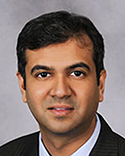When the COVID-19 pandemic arrived in the South Suburbs last March, most people quickly learned that staying home was a good way to reduce the odds of contracting COVID-19.
Local health care professionals advocate one important caveat: Don’t stay home so much that you neglect other important health care measures, such as cancer screenings.
Dr. Masood Ghouse, an oncology specialist who practices at the Franciscan Health campus in Olympia Fields, said the pandemic contributed to fewer people seeking screenings.
“In general a lot of people were scared to come in. Less screening was done,” he said. “The impact of that was you are detecting cancers at more advanced stages. The treatment gets more involved. That was a huge impact last year.”
As the pandemic continued, people began to regain confidence in the safety precautions taken by hospitals, and gradually they began attending to their health needs.
That’s important because taking cancer screening tests when appropriate can sometimes dramatically increase survival rates, Ghouse said.
He cited a recent finding by the National Cancer Institute on the effect of the pandemic on cancer deaths.
“Modeling the effect of COVID-19 on cancer screening and treatment for breast and colorectal cancer (which together account for about one-sixth of all cancer deaths) over the next decade suggests almost 10,000 excess deaths from breast and colorectal cancer deaths,” said Norman E. Sharpless, NCI director, in an article published in Science magazine.
Ghouse said early detection is important. For example, a cancer caught in stage one might have a five-year survival rate of 80%, but the same cancer diagnosed at stage four might have a five-year survival rate of 10%, illustrating the importance of early detection.
He noted that the chance of developing cancer at some point is high, 40% for men and 38% for women, adding that the latest treatment techniques and technologies have increased survivability dramatically, and screenings are part of the process of improved survivability.
Whether screening tests are appropriate depends on a person’s lifestyle and genetics. Alcohol use, smoking and obesity continue to be risk factors for developing cancer, as is a history of cancer in the family.
Ghouse said people should always consult their primary care physician about whether they should consider screening tests.
In addition to lifestyle and genetic factors, people should check with their doctor if they experience symptoms that could indicate cancers, such as unexplained weight loss, a lump in the breast or blood in the stool.
Ghouse said with the pandemic putting enormous demands on health care professionals, it’s more important than ever for patients and their families to initiate discussions about health concerns.
For those who may still be nervous about the safety of visiting a hospital or clinic to get tested, he noted that medical care facilities and their staffs adapted quickly to the virus, adopting new procedures for keeping patients safe.
Ghouse said virtual consultations are becoming more common, offering a convenient, pandemic-safe way to have discussions about whether cancer screenings are necessary.


